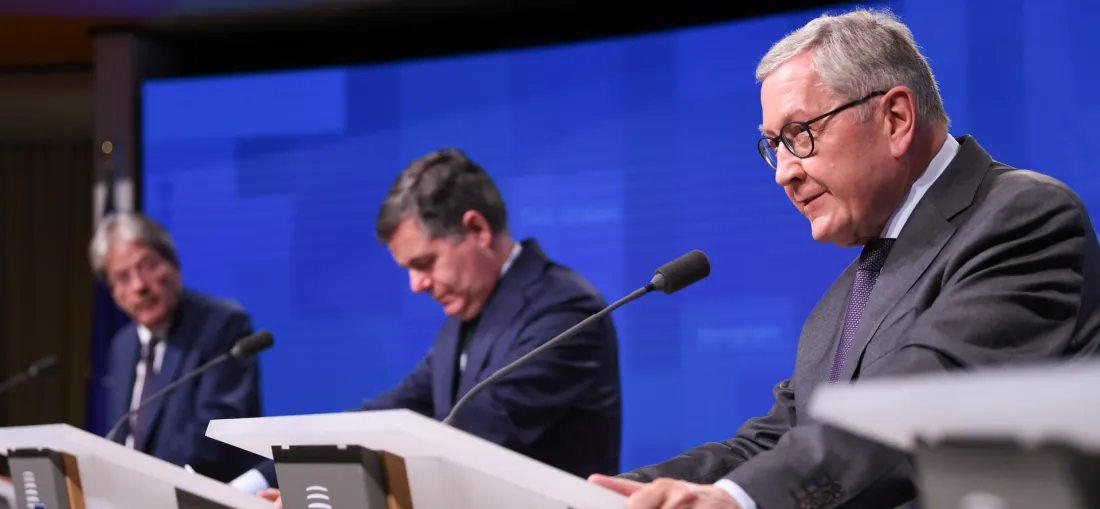Klaus Regling at Eurogroup press conference, July 2022

Transcript of remarks by ESM Managing Director Klaus Regling
Press conference after Eurogroup meeting
11 July 2022
Good evening. Let me add a few points from the ESM perspective. As you heard, we have not selected a new Managing Director, but I think that's not really an issue because I will be around for three more months, and I intend to work during these months. And then in September I'm confident we'll find a solution.
On the economic situation and the outlook; as you heard, there was broad convergence on the assessment of the current situation among ministers, but importantly also with the IMF that was present in today's meeting. Of course, the war in Ukraine, rising energy and commodity prices, high inflation and ongoing supply chain problems are putting a massive strain on the economy, on consumers.
So the expected growth rates are getting smaller. That's also the view in the markets. But when that happens, it's not surprising that you also find a lot of volatility in the financial markets. Markets are currently adjusting to a new environment with high inflation and higher interest rates - an environment that most market participants have never experienced during their professional life. And when markets adjust to such a new environment, there can be overshooting.
But it does not mean that we are facing a new euro crisis. We may see less growth than expected earlier in the year, but there are also a number of positive factors at play, like the momentum coming out of the pandemic, as the unlocking still has a positive impact, particularly on services. We do have importantly the Next Generation EU that was designed and agreed during the pandemic but is also extremely helpful now to promote public investment and reforms. We have high savings of households accumulated during the two pandemic years that can be used to support consumption.
We have strong balance sheets of banks and the corporate sector. So it's not all doom and gloom. Maybe growth rates will be lower, but there are also these positive factors. In that context, of course, the discussion on the appropriate policy stance in the euro area was very important, and we heard the presentation of the European Fiscal Board. I think the situation as we see it requires a prudent fiscal stance, and I think the statement of the Eurogroup reflects exactly that very well. It gives also important guidance to markets, and I fully agree with Commissioner Gentiloni that it reflects stability, coordination and agility.
On Croatia, of course, we are very happy at the ESM that Croatia will join our family. Croatia will join the ESM after joining the euro area, and we are all happy about the remarkable progress that we have been seeing in Croatia over the last few years. The technical preparations for Croatia to join the ESM have started and will go very smoothly. Thank you.
Response to question on why Klaus Regling is confident that there will not be a new euro crisis
Indeed, and I have said it before, I do not see a euro crisis triggered by interest rate increases in the near future. That's what I read sometimes. But I don't think that is a correct assessment because the situation today is completely different from 10, 12 years ago. 10, 12 years ago, during the euro crisis, there was a reason why a number of countries lost market access.
They had real fundamental problems, underlying disequilibria; they had lost competitiveness. Therefore, there were very large trade and current account deficits, also large fiscal deficits in some countries, and rapidly rising debt. We don't have that situation at the moment. We don't have countries with very large current account deficits. We don't have countries where competitiveness has been lost.
Every country has something to fix. Every country should work hard to strengthen the growth potential. But that's completely different from 10, 12 years ago when a number of countries really had problems and markets were no longer willing to finance them. I don't see that at all at the moment.
Of course, the debt is higher than before the pandemic. The pandemic led to necessary fiscal action that increased the debt level. We see a little bit of that now as a result of the war in Ukraine, because defence expenditures go up in some countries, the costs for refugees go up, so debt levels are higher.
But when I look at the debt service payments, the interest payments that the different euro area member states have to do every year, they are in terms of GDP at the lowest level in the last 50 years in all member states, despite the high debt level. So there's no problem for a number of years.
And that does not mean, of course, that countries should not be prudent in their fiscal policies, because new expenditures will come up over time, because of demographics and ageing, the transformation towards green and digital.
And that's all reflected in the statement of the Eurogroup today that countries are determined to be prudent. But that's a very different story from saying we are entering a next crisis because interest rates go up.
Contacts


